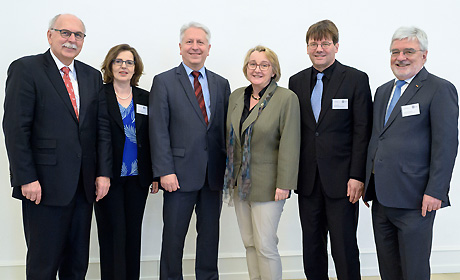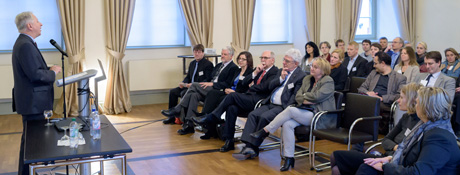Leibniz ScienceCampus for the Analysis of Digital Linguistic Data Officially Opened
19. November 2015
Joint research project of the Department of Computational Linguistics at Heidelberg University and the Institute for the German Language in Mannheim

Photo: Rothe
The official opening ceremony of the new Leibniz ScienceCampus “Empirical Linguistics and Computational Language Modeling” – a research project of the Institute for the German Language (IDS) in Mannheim and the Department of Computational Linguistics at Heidelberg University – was held on 18 November 2015. The four-year joint research project will focus on developing new methods, models and tools to compile and analyse digital language data. Leibniz Association President Prof. Dr. Matthias Kleiner and Baden-Württemberg Minister of Science Theresia Bauer both attended the ceremony at Ruperto Carola.
“Together, the Institute for the German Language and the department of Computational Linguistics of Heidelberg University make up an extremely successful partnership at the intersection of German linguistics and computational linguistics. The Leibniz ScienceCampus blends their complementary expertise in a new and exciting way. It is precisely this type of interdisciplinary research cooperation that we expect will produce the most amazing results in the future,” said Minister Bauer.
According to Prof. Dr. Andreas Witt, the current state-of-the-art in storing and analysing language electronically in the form of texts or audio recordings has the potential to revolutionise research methods in linguistics, the humanities and cultural studies. “New approaches and tools have to be developed to process big data and make it available for other applications,” explained Prof. Witt, spokesperson for the Leibniz ScienceCampus and director of the Research Infrastructures area at the Institute for the German Language. Prof. Dr. Anette Frank emphasised the need to also develop innovative research methods for linguistics and computational linguistics. “We also want to make these methods and tools available for new research questions in the digital humanities,” added Prof. Frank, director of the Department of Computational Linguistics at Heidelberg University.
The main research themes of the Leibniz ScienceCampus include the processing and statistical analysis of huge amounts of language data. The scientists involved want to build on this to develop innovative language processing models for German. These models are intended to enable the automatic analysis of language from different genres and domains and thereby improve the interpretation of various language corpora from – e.g. social media texts, spoken language and specialist or literary texts. Besides linguists, other partners involved in the joint project include computer scientists and linguists from the University of Mannheim and Heidelberg University, along with computational linguists from the Heidelberg Institute for Theoretical Studies.
The research work, which was awarded funding in the amount of 2.6 million euros, already began this summer. In addition to funding from the Leibniz Association, the project is also receiving financial support from Baden-Württemberg's Ministry of Science, Research and the Arts. The purpose of the Leibniz ScienceCampus is to boost interdisciplinary cooperation between university and non-university research. It aims to create networks in order to expand the respective field of research and raise its scientific research profile.

Photo: Rothe
Heidelberg University President Prof. Dr. Bernhard Eitel and the Director of the Institute for the German Language Prof. Dr. Ludwig M. Eichinger had invited to the opening ceremony of the Leibniz ScienceCampus “Empirical Linguistics and Computational Language Modelling”. The ceremony opened with words of welcome from Prof. Eitel, followed by the Science Minister, the President of the Leibniz Association and the IDS Director. Prof. Frank, co-spokesperson of the joint project, gave an introductory presentation entitled “How much linguistics is in computational linguistics”. Keynote speaker Prof. Dr. John Nerbonne of the University of Groningen (The Netherlands) discussed “Community of values: empiricism and modelling”. Project spokesperson Prof. Witt closed the ceremony.

